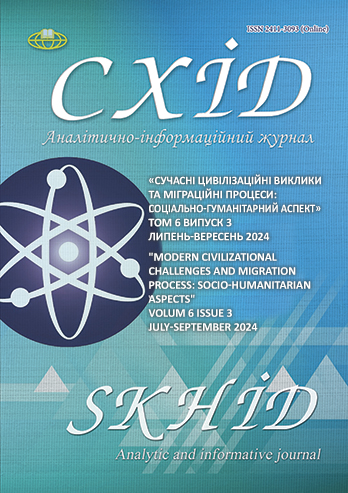Immigration Discourse as a Distraction from Institutional Failures
DOI:
https://doi.org/10.21847/2411-3093.635Keywords:
Immigration, institutional dysfunction, scapegoat mechanism, mimetic theory, economic stagnation, social stagnation, institutional innovation, social philosophyAbstract
This paper examines how the intense focus on immigration in Western societies serves as a distraction from more fundamental institutional failures across various sectors. Through a multi-faceted qualitative approach combining critical discourse analysis, comparative institutional analysis, and philosophical inquiry, we investigate the rhetoric surrounding immigration and its purported impacts. Our findings reveal that immigration discourse often functions as a smokescreen, obscuring systemic issues such as economic stagnation, housing crises, healthcare inefficiencies, and educational shortcomings. By applying theoretical frameworks from thinkers like Girard, Habermas, and Žižek, we demonstrate that the scapegoating of immigrants is a complex societal mechanism allowing for the displacement of anxieties stemming from institutional dysfunction. The research highlights the contrast between stagnation in traditional sectors and the dynamism of the technology industry, underscoring the need for comprehensive institutional reform. We argue for reframing public discourse away from divisive immigration debates and towards addressing root causes of social and economic challenges. This study contributes to a more nuanced understanding of contemporary societal issues and calls for a shift in focus towards meaningful institutional reform to create more efficient, institutions capable of addressing 21st-century challenges.
Downloads
References
Arendt, Hannah (1963). Eichmann in Jerusalem: A Report on the Banality of Evil. New York, Viking Press.
Bateson, Gregory, Jackson, Don D., Haley, Jay and Weakland, John (1956). Toward a Theory of Schizophrenia. Behavioral Science, 1(4), 251–264.
Berwick, Donald M., Nolan, Thomas W. and Whittington, John (2008). The Triple Aim: Care, Health, and Cost. Health Affairs 27, no. 3 (2008): 759–769.
Draghi, Mario (2024). The Future of European Competitiveness. Brussels, European Commission. Retrieved from https://commission.europa.eu/document/download/97e481fd-2dc3-412d-be4c-f152a8232961_en?filename=The%20future%20of%20European%-20competitiveness%20_%20A%20competitiveness%20strategy%20for%20Europe.pdf
Fochios, Alexandra (2024). The Rats Don’t Run This City, We Do: How Federal and State Agency Collaboration Can Aid in the ‘War on Rats’ in the Public Housing Developments. Administrative Law Review, 76(2), 489–516.
Girard, René (1965). Deceit, Desire, and the Novel: Self and Other in Literary Structure. Baltimore, Johns Hopkins University Press.
Girard, René (1977). Violence and the Sacred. Baltimore, Johns Hopkins University Press.
Girard, René (1986). The Scapegoat. Baltimore, Johns Hopkins University Press.
Habermas, Jürgen (1987). The Theory of Communicative Action, Volume 2: Lifeworld and System: A Critique of Functionalist Reason. Boston, Beacon Press.
Habermas, Jürgen (1989). The Structural Transformation of the Public Sphere: An Inquiry into a Category of Bourgeois Society. Cambridge, MA: MIT Press.
Han, Byung-Chul (2015). The Transparency Society. Stanford, CA: Stanford University Press.
Herzlinger, Regina E. (2006). Why Innovation in Health Care Is So Hard. Harvard Business Review, 84, no. 5, 58–66.
McKinsey Global Institute (2017, February 27). Reinventing Construction through a Productivity Revolution. Retrieved from https://www.mckinsey.com/capabilities/operations/our-insights/reinventing-construction-through-a-productivity-revolution
McKinsey Global Institute (2020). The Future of Work in America: People and Places, Today and Tomorrow. Retrieved from https://www.mckinsey.com/featured-insights/future-of-work/the-future-of-work-in-america-people-and-places-today-and-tomorrow
National Academies of Sciences, Engineering, and Medicine (2017). The Economic and Fiscal Consequences of Immigration. Washington, DC: The National Academies Press.
Nickerson, Raymond S. (1998). Confirmation Bias: A Ubiquitous Phenomenon in Many Guises. Review of General Psychology, 2 (2), 175-220.
OECD (2013), International Migration Outlook 2013, OECD Publishing, Paris, https://doi.org/10.1787/migr_outlook-2013-en
OECD (2019), PISA 2018 Results (Volume I): What Students Know and Can Do, PISA, OECD Publishing, Paris, https://doi.org/10.1787/5f07c754-en.
OECD (2021), Government at a Glance 2021, OECD Publishing, Paris, https://doi.org/10.1787/1c258f55-en
Papanicolas, Irene, Woskie, Liana R. and Jha, Ashish K. (2018). Health Care Spending in the United States and Other High-Income Countries. JAMA 319, no. 10, 1024–1039.
Tajfel, Henri, and Turner, John (1979). An Integrative Theory of Intergroup Conflict. In The Social Psychology of Intergroup Relations, edited by William G. Austin and Stephen Worchel, 33–47. Monterey, CA: Brooks/Cole.
World Bank. (2020). Doing Business 2020. Washington, DC: World Bank. Retrieved from https://documents1.worldbank.org/curated/fr/688761571934946384/pdf/Doing-Business-2020-Comparing-Business-Regulation-in-190-Economies.pdf
Žižek, Slavoj (2010). Living in the End Times. London, Verso.
Žižek, Slavoj (2014). Trouble in Paradise: From the End of History to the End of Capitalism. London, Allen Lane.
Downloads
Published
How to Cite
Issue
Section
License
Copyright (c) 2024 Teodor Hryvna

This work is licensed under a Creative Commons Attribution-NonCommercial-NoDerivatives 4.0 International License.
1. Authors bear responsibility for the accuracy of facts, quotations, numbers and names used.
2. Manuscripts are not sent back.
3. The publisher does not always agree with the authors' opinion.
4. The authors reserve the right to authorship of the work and pass the first publication right of this work to the journal under the terms of a Creative Commons Attribution-NonCommercial-NoDerivatives 4.0 International License. This license allows others to distribute (copy) the published work for non-commercial purposes, provided there is mandatory attribution to its authors and a link to the first publication in our journal.
5. The authors have the right to conclude separate supplement agreements that relate to non-exclusive work distribution in the form in which it has been published by the journal (for example, to upload the work to the online storage of the journal or publish it as part of a monograph), provided that the reference to the first publication of the work in this journal is included.

